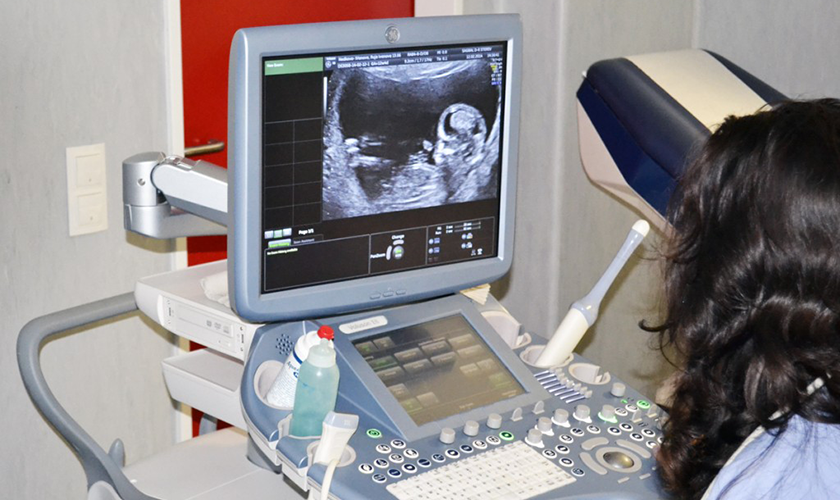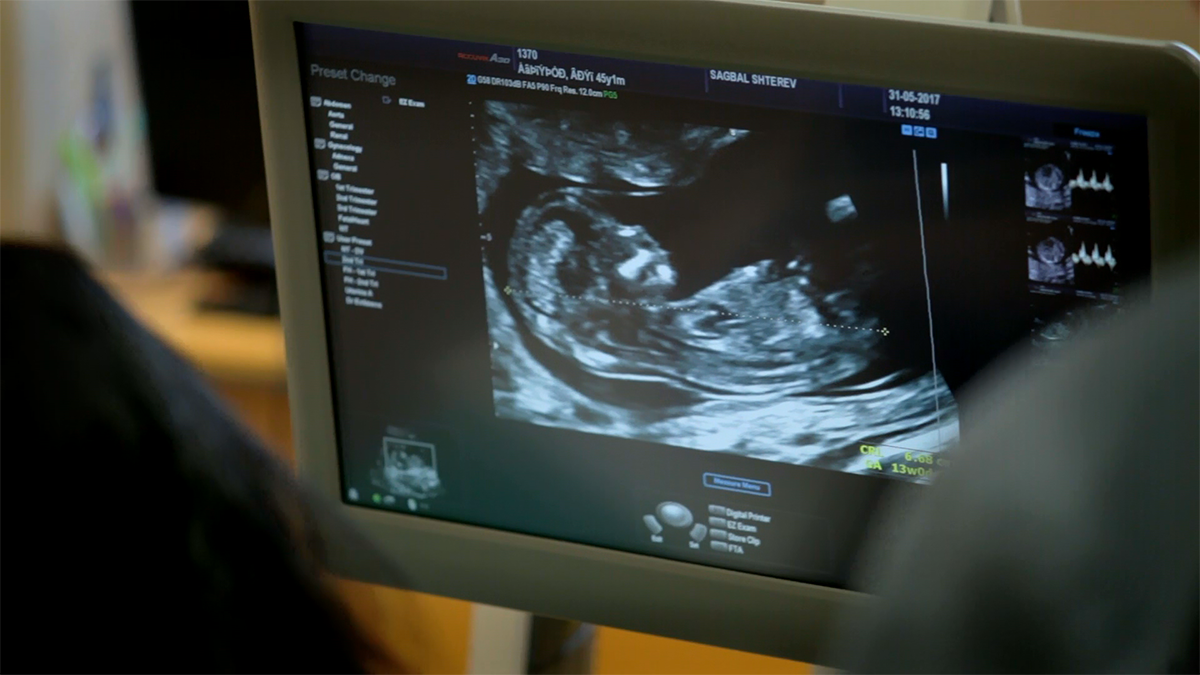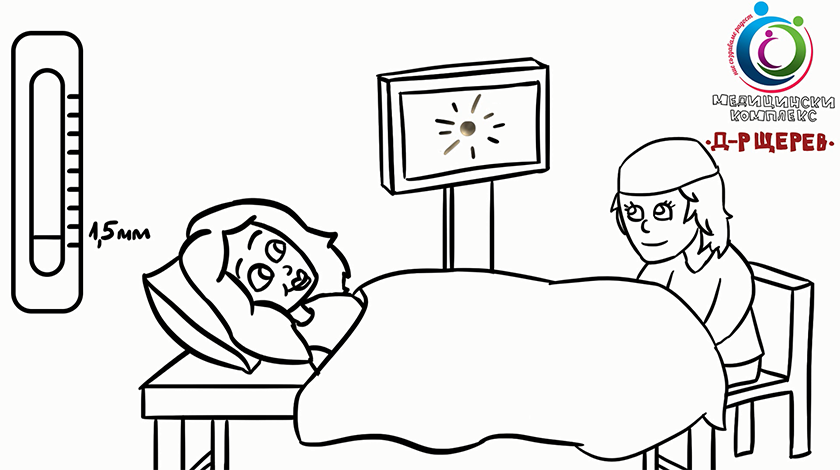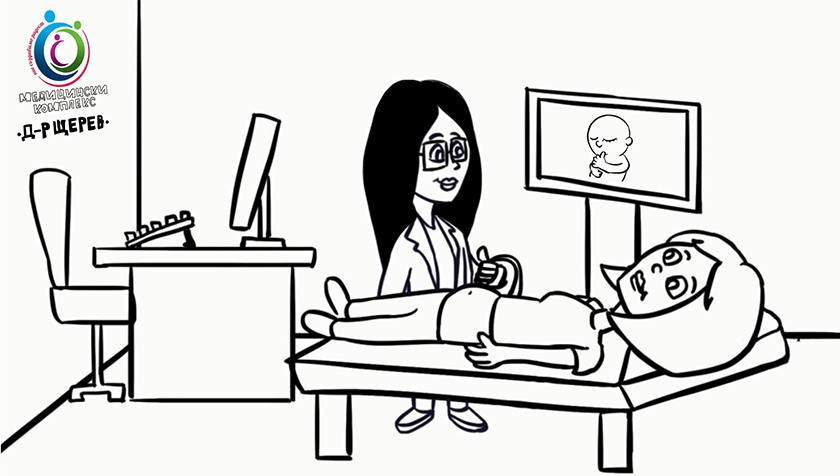
First-trimester screening test for chromosome abnormalities - accents
- The first-trimester test (also known as “biochemical screening”) includes ultrasound examination of the fetus and a blood test of the pregnant woman.
- The pre-eclampsia test is done at the same time as the chromosomal diseases tests such as Down syndrome (11-13 weeks).
- A first-trimester test is mandatory for all pregnant women in 11-13 weeks of pregnancy in both single and twins pregnancy.
First-trimester screening test for chromosome abnormalities
Most of the babies usually are developed, but for all women, doesn’t matter their age, there is a risk to deliver a baby with neurological or mental retardation. In a small number of cases, the anomaly is due to chromosome abnormalities such as trisomy 21 (Down syndrome), trisomy 18 (Edwards syndrome), trisomy 13 (Patau syndrome).
What is trisomy 21, 18 or 13?
There are 23 types of chromosome pairs in the human species. Therefore there are a total of 46 chromosomes. In trisomy, there are three instead of two chromosomes at a specific site (21, 18, and 13). The most common trisomy is 21 (Down Syndrome): Trisomy 21 has a frequency of 1 in 700 births and the risk increases with increasing maternal age. It is characterized by intellectual child deficiency, structural defects such as heart abnormalities and specific appearance. The expected life continuance is twice as low as that of a healthy individual.
Trisomy 13 and 18 occur in a ratio of 1:7000 births, with the risk rising as maternal age progresses. Babies have a pronounced intellectual deficit and structural defects. Typically, fetuses with trisomy 18/13 die during intrauterine life and/or soon after birth. In some cases, they live up to one year.
What is the first-trimester chromosome abnormalities test?
The first-trimester test (also known as “biochemical screening”) includes ultrasound examination of the fetus and a blood test of the pregnant woman for measuring two pregnancy substances that are placental products (free β-hCG and PAPP-A). Ultrasound and maternal blood tests are combined into a software program, and the risk for trisomy 21, 18, 13 is calculated. During the ultrasound examination, the fetal medicine specialist monitors the amount of fluid behind the baby's neck, nodular fold of the nasal bone, examines the right heart valve and a small vessel in the liver (ductus venosus).
The ultrasound test of the nodal fold ant the chromosomal abnormality test in the first trimester may detect a 90-95% defect in trisomy 21, 18, and 13. The test provides information on the risk of chromosome abnormalities as well as detecting large anatomical defects of the fetus.
Who must do the test of the nodal fold in the first trimester?
All pregnant women in 11-13 weeks must do the first-trimester test, in both cases with single or twins pregnancy.
What is the procedure during the Chromosome Anomaly Exclusion Examination in Dr. Shterev Hospital?
When you come to the hospital, you will meet a specialist, who will do a detailed ultrasound test and will explain to you every result. Before the examination, you have to visit our laboratory for a blood test. The results from this test are ready in 24 hours and they will be analyzed from the fetal specialist together with the ultrasound diagnosis.
How do you get your results?
The results are examined by a specialist in fetal medicine, who personally informs the patient about his conclusions. Based on the results, the attending gynecologist and the patient may together decide whether the information obtained is sufficient or additional diagnostic tests are needed to reject the presence of chromosomal abnormalities safely.
If there is doubt whether the fetus has a chromosomal abnormality or not, an invasive diagnostic test such as CVS, 11-15 gestational weeks, or amniocentesis, is performed after 16 gestational weeks. The risk of miscarriage in both procedures is 1%.
The Chromosome Abnormality Test in the First Trimester is one of the mandatory pregnancy monitoring examinations in the Dr. Shterev Hospital.
For the first time in Bulgaria – a mandatory preeclampsia test
To make you feel even calmer during your pregnancy all pregnant women do additional preeclampsia examinations. . The test is done when you perform the chromosomal anomaly test in the first trimester (11-13 weeks).
The focus of maternal-fetal medicine is not only for chromosomal and structural abnormalities. Today, good practice requires monitoring for other conditions that could cause serious complications that would endanger the pregnant woman and the baby that is done by our fetal medicine specialists.
Preeclampsia examination is done together with the chromosomal abnormalities tests such as Down syndrome (11-13 weeks).
For pregnant women, the introduction of screening for preeclampsia is only beneficial and does not complicate prenatal care. The additional biochemical marker is measured from the same blood sample taken in the chromosomal anomaly assay. Thus the pregnant women in the Dr. Shterev Hospital receive even greater security during their pregnancy.
Fetal Medicine examinations - book your appointment
Make an appointment for one of the most important examinations with a fetal medicine specialist. Call us on 02 920 09 01.
It is important to know that you need to contact our team at least two weeks before the planned visit to the clinic, to anticipate you in the schedule of our highly professional specialists.
Video: Our fetal medicine specialists
They are the doctors who take care of the tiniest patients in the mommy's belly. They show you the smile, the hands and the feet of your baby even before its birth. We present you our fetal medicine specialist and the Fetal Medicine department of Dr. Shterev Hospital.
Take a few minutes to learn when are performed and what information about the condition of the pregnant woman and her baby give the three highly specialized fetal medicine examinations - first-trimester screening test, fetal morphology, and third-trimester fetal morphology with Doppler examination.
Video: The first trimester of the gestation
We meet you again with the charming Dr. ARTi from Dr. Shterev Hospital, who will introduce you in this video with the changes in woman’s body in the first trimester of the gestations, and with the required examinations and tests in this stage of the pregnancy. More videos about the medical care in Dr. Shterev Hospital are available on our YouTube channel: https://www.youtube.com/user/ShterevHospital
Video: Fetal medicine examinations
We meet you again with the charming Dr. ARTi, who will introduce you to one of the most critical examinations during the pregnancy - those performed by the fetal medicine specialist. Watch our animated video and earn more about the first-trimester screening test, the fetal morphology in the second and in the third trimester of the gestation.
First-trimester screening test - resume
Learn more for chromosome abnormalities screening and the preeclampsia prevention in Dr. Shterev Hospital. Call on 02 920 09 01! Our client service specialists will direct you to on-site consultation or will arrange for you a visit with a fetal medicine specialist. This is the only way for you to be secure and calm during your pregnancy.
Look who are our specialists HERE.
 Медицински комплекс „Д-р Щерев”
Медицински комплекс „Д-р Щерев” 

